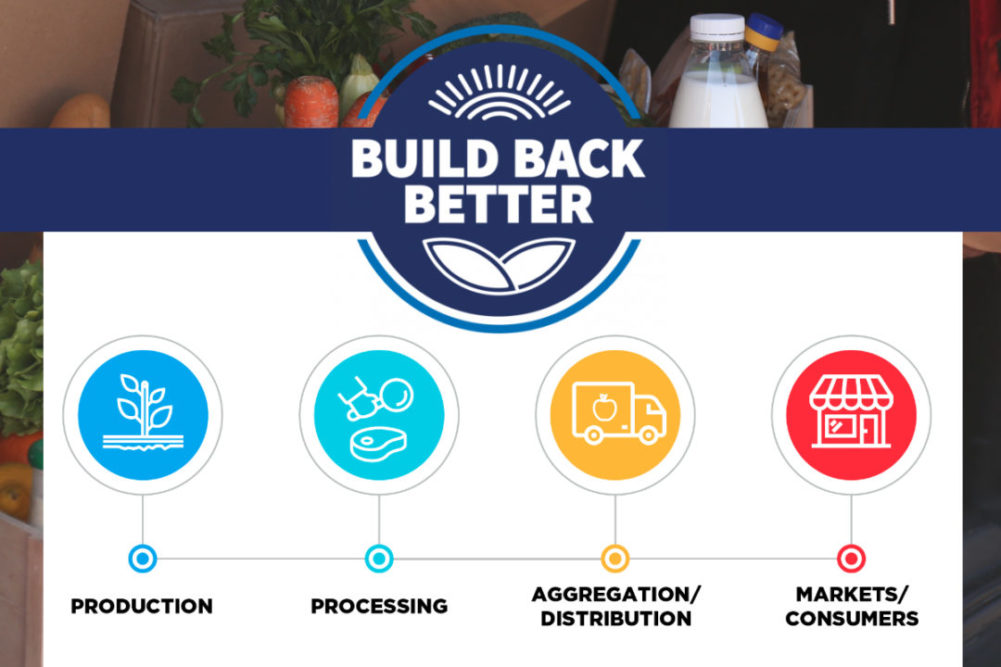WASHINGTON, DC, US — Pointing to lessons learned during the COVID-19 pandemic and recent supply chain disruptions, the US Department of Agriculture on June 8 announced plans to invest more than $4 billion to strengthen critical supply chains through the Biden administration’s Build Back Better initiative. The new effort aimed to strengthen the food system, create new market opportunities, tackle the climate crisis, help communities that have been left behind, and support good-paying jobs throughout the supply chain.
The announcement was in support of the Biden administration’s broader work on strengthening the resilience of critical supply chains as directed by Executive Order 14017 America’s Supply Chains. Funding will be provided by the American Rescue Plan Act and earlier pandemic assistance such as the Consolidated Appropriations Act of 2021.
Through the Build Back Better initiative, the USDA said it will help ensure the food system of the future is fair, competitive, distributed, and resilient. The USDA said it will promote access to healthful and affordable food, ensure growers and workers receive a greater share of the food dollar, and advance equity as well as climate resilience and mitigation.
“The COVID-19 pandemic led to massive disruption for growers and food workers,” said Secretary of Agriculture Tom Vilsack. “It exposed a food system that was rigid, consolidated, and fragile. Meanwhile, those growing, processing and preparing our food are earning less each year in a system that rewards size over all else.
“The Build Back Better initiative will make meaningful investments to build a food system that is more resilient against shocks, delivers greater value to growers and workers, and offers consumers an affordable selection of healthy food produced and sourced locally and regionally by farmers and processors from diverse backgrounds. I am confident USDA’s investments will spur billions more in leveraged funding from the private sector and others as this initiative gains traction across the country. I look forward to getting to work as co-chair of the new Supply Chain Disruptions Task Force and help to mobilize a whole-of-government effort to address the short-term supply challenges our country faces as it recovers.”
The Build Back Better Initiative will seek to strengthen and transform critical parts of the food system, the USDA said. As it makes investments through this initiative, the USDA said it also will seek to increase transparency and competition with attention to how certain types of conduct in the livestock markets and the meat processing sector have resulted in thinly traded markets and unfair treatment of some farmers, ranchers and small processors. Among other investments in the food system and food supply chain, the USDA said its Build Back Better initiative will specifically address the shortage of small meat processing facilities as well as the necessary local and regional food system infrastructure needed to support them.
Funding announcements under the Build Back Better initiative will include a mix of grants, loans, and financing mechanisms for the following priorities:
Food Production: The USDA said it will invest in the current and future generation of food producers and workers throughout the food system with direct assistance, grants, training and technical assistance, and more.
Food Processing: The USDA said the pandemic highlighted challenges with consolidated processing capacity. It created supply bottlenecks that led to a drop in effective plant and slaughter capacity. Small and midsize farmers often have struggled to compete for processing access. The USDA said it will make investments to support new and expanded regional processing capacity.
Food Distribution and Aggregation: Food aggregation and distribution relies on people working together throughout the food system and having the appropriate infrastructure to gather, move and hold the food where and when it is needed. This system was stressed during the pandemic due to long shipping distances and lack of investment in local and regional capacity. The USDA said it will make investments in food system infrastructure that can remain resilient, flexible and responsive.
Markets & Consumers: The USDA said it will support new and expanded access to markets for a diversity of growers while helping eaters access healthy foods.




